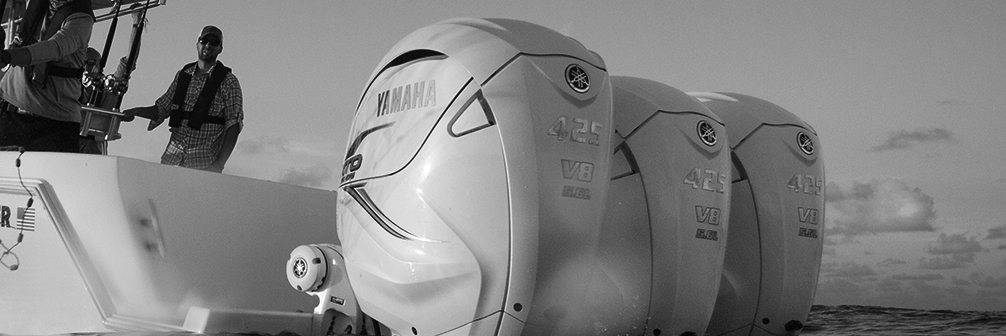Yamaha, Roush and Regulator Marine Make Waves During 2024 SEMA Show® with World’s First Hydrogen-Powered Outboard
LAS VEGAS, Nev. – Nov. 13, 2024 – Yamaha U.S. Marine Business Unit joined forces with Roush® and Regulator Marine to reveal the world’s first hydrogen-powered outboard for recreational boats, to car manufacturers, automotive component suppliers and aftermarket equipment manufactures from around the globe during the 2024 Specialty Equipment Marketing Association (SEMA) Show, Nov. 4-8 in Las Vegas, Nev. Complimented by a hydrogen fuel system designed by Roush, to power the outboard, and a custom boat hull from Regulator Marine, the Yamaha H2 outboard concept was on display for 160,000 registered attendees, includnig over 2,300 approved media, during the course of the show.
Together, Yamaha, Regulator and Roush highlighted the future of propulsion, setting the stage for a groundbreaking crossover between marine and automotive innovation. With a goal of achieving carbon neutrality by 2035 for operations and 2050 for products, Yamaha is championing a multi-technology approach aligned with SEMA initiatives to motivate others in the industry to pursue carbon neutrality within product lines.
“Why did we decide to exhibit at SEMA? Because Yamaha and SEMA share a belief that there is no one-size-fits-all solution for carbon-neutral products, and hydrogen is a formidable contender for the future of cleaner internal combustion engines,” said Grant Suzuki, Chief of Technology, Yamaha U.S. Marine Business Unit. “Internal combustion will continue to be a necessary component in recreational boating. We’re also advocating publicly for sustainable fuels, hydrogen and other technologies we can deploy to continue to meet customer expectations. We received a tremendously positive response from show attendees, and we look forward to sharing more about the H2 outboard as we continue to test and collect data.”
Yamaha’s presence at the show included a FutureTech Fireside Chat with Grant Suzuki, Chief Technology Officer, Yamaha U.S. Marine Business Unit; Matt Van Benschoten, Vice President, Advanced Engineering, Roush; and Don Seal, Manufacturing Engineer, Regulator Marine. Martin Peters, Yamaha U.S. Marine Business Unit Director of External Affairs, moderated the discussion. Exemplifying the power of cross-industry collaboration, the three panelists discussed the promise of hydrogen fuel as well as a multi-technology approach to carbon neutrality that also includes sustainable drop-in fuels and electric applications.
Suzuki also participated in a separate panel entitled, “Advanced Fuels and Powertrains: Current Landscape and Innovations,” alongside panelists Robert Wimmer, Director of Energy and Environmental Research, Carbon Neutrality and Regulatory Affairs, Toyota®; Tom Holm, Executive Director, Department of Defense Energy Defense Council; Kaustav Sinha, Director of Strategic Partnerships, Chevron®; Josh Budworth, Vice President of Business Development, Alliance AutoGas®; and Jeff Wilkerson, Pearson Fuels™, Government Policy and Regulatory Affairs Manager. Moderated by Jamie Butters, Executive Editor of Automotive News®, the panel discussion delved deeper into how the industry can help reduce carbon emissions by adopting various fuel technologies for internal combustion engines (ICE), as well as the innovative powertrains that can work alongside electrification.
Yamaha has a long-standing commitment to exploring innovative and sustainable technologies, including hydrogen as a potential fuel source. The company's interest in hydrogen technology began in 2003 with early research into alternative energy solutions aimed at reducing environmental impact. Over the years, Yamaha collaborated with various partners to develop hydrogen-powered engines. These efforts align with Yamaha's broader strategy to reduce carbon emissions and contribute to a more sustainable future. By exploring hydrogen as a clean and renewable energy source, Yamaha is advancing environmental goals while maintaining performance and reliability.
The pursuit of hydrogen technology is just one example of Yamaha’s suite of multiple technology solutions to reduce carbon. Earlier this year Yamaha Motor Co., Ltd. acquired electric marine propulsion leader Torqeedo GmbH, expanding Yamaha's capabilities in electric and hybrid power. In addition, Yamaha is also actively researching and promoting the use of sustainable marine fuels as part of ongoing efforts toward carbon neutrality across the industry.
Yamaha U.S. Marine Business Unit, based in Kennesaw, Ga., markets and sells marine outboard motors ranging in size from 2.5 to 450 horsepower. It also engineers, manufactures, markets and sells boat control systems, IoT control devices, fiberglass, jet-drive sport boats ranging from 19 to 27 feet, and personal watercraft. The unit includes the manufacturing divisions of Yamaha Marine Systems Co., Inc., including Yamaha Marine Rotational Molders (rotational molding), Bennett Marine of Deerfield Beach, Fla. (trim tabs), and Yamaha Marine Precision Propellers of Indianapolis (stainless steel propellers). Yamaha U.S. Marine Business Unit is a division of Yamaha Motor Corporation, U.S.A., based in Cypress, Calif.
###
This document contains many of Yamaha's valuable trademarks. It may also contain trademarks belonging to other companies. Any references to other companies or their products are for identification purposes only and are not intended to be an endorsement. Roush® is a registered trademark of Roush Enterprises, Inc.
REMEMBER to always observe all applicable boating laws. Never drink and drive. Dress properly with a USCG-approved personal floatation device and protective gear.
© 2024 Yamaha Motor Corporation, U.S.A. All rights reserved.

